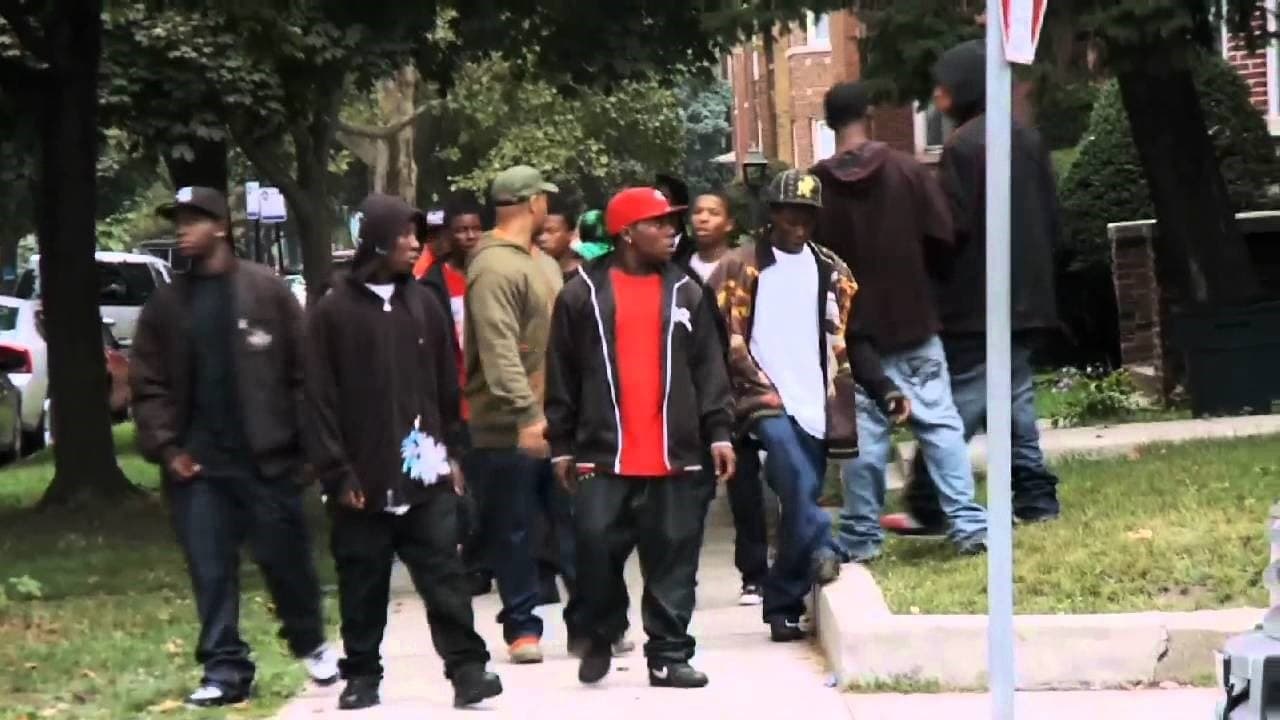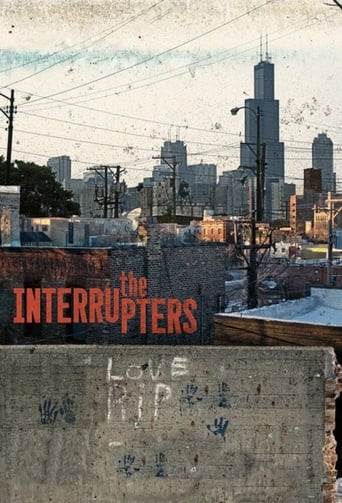Frances Chung
Through painfully honest and emotional moments, the movie becomes irresistibly relatable
Taha Avalos
The best films of this genre always show a path and provide a takeaway for being a better person.
Edwin
The storyline feels a little thin and moth-eaten in parts but this sequel is plenty of fun.
jadepietro
This film is recommended.Flowers and candles, hand-printed messages written on notebook paper tacked to makeshift shrines, all decorated with photographs of young victims. This touching memorials litter the blood-spattered streets of Chicago and are the remains of the day in The Interrupters, a powerful and disturbing documentary by the talented Steve James ( Hoop Dreams ).His film takes the moviegoer directly into the crime-ridden neighborhoods as we meet a group of peacemakers trying to restore sanity and preaching their anti-violence message to the choir. The group is called CeaseFire and it is made up of ex-gang leaders and former convicts whose motto is Stop the Violence - Save a Life.James directed and photographed his documentary and focuses on three interrupter and their "scared straight" strategies of tough love and reality checks. We met Cobe Williams, a former gang member and family man now whose father was killed during a street fight, Eddie Bocanegra, a young man easily impressed by the gang's image of fast cars, money, and girls who served 14 years for murder and now uses art as a method of expression and conflict mediation, and the primary spokesperson, Ameena Matthews, the daughter of a gang leader who was physically, emotionally, and sexually abused at an early age and has since let faith and family lead her away from that life-style and keep her grounded.We also met some of those troubled teens: Caprysha, a defeated Precious type, living in a halfway house, dreaming of a better life while constantly lying and breaking her parole; Lil Mikey, released from prison and wanting to be a better role model for his siblings; and Flamo, a young man enraged with his mother and brother's arrest and wanting his own form of justice. It is impossible not to care about their people and their lives.The film consists of interviews with gang members, families of their victims, and scenes of escalating violence. At times, The Interrupters becomes slightly repetitive in its interventions and lock-step mindset of anger and frustration. More judicious editing could have made the film even more forceful. But the passion for its compelling subject and James' craft as a filmmaker make up for those minor complaints.The documentary gives us no easy answers as drugs, unemployment, alcohol, poverty,and guns still are a major reason for the neighborhood's ills. Politicians come and go with each election, giving lip service and promises. Yet these people and their difficult lives become the on-going problem in search of a solution, and groups like CeaseFire seem to be their only course of positive action. The Interrupters allows us to see a world that we can never fathom and acknowledge the spirit of a group of strong-willed survivors, trying to make a difference and save a life or two throughout a normal day. GRADE: BNOTE: Visit my movie blog for more reviews: www.dearmoviegoer.com
proterozoic
Chicago, Baltimore, Oakland, Detroit – synonyms for American crime, places where young men kill one another in the streets. Bleak background noise in the national news, with dim flares of outrage at especially gruesome killings.On the subject of solutions, our imaginations are dismally poor and usually limited to applying money or violence in some form. More police, more arrests, longer sentences, talk of the National Guard on the streets.The Interrupters seem to have a better gimmick. The violence prevention group CeaseFire recruited a group of tattooed ex-gang-members in Chicago, most of whom turned away from crime after cooling off in hospitals or prisons. They know the locals, and they have credibility where cops, teachers and politicians don't.The film follows several of them: a tough gang heiress turned devout Muslim, an imposing man with several prison terms for drugs and violence, and a soft-spoken Latino out after serving 14 years for murder. Interrupters are, in effect, roaming street counselors; unlike the armchair type, they usually find themselves between two or more people who are about to begin stabbing one another. They are to ordinary counselors what BASE jumpers are to people who feel proud of taking stairs.The rare and valuable insight of the film is how, over the course of a year, the counselors manage to talk down people who're about to do horrible things, and how these people arrive at such a place to begin with. None of them are remorseless sociopaths, and none of them appear to want or relish violence. They want the best for themselves, they value their families, and yet some have come to the verge of actual fratricide. Why? Hopelessness, poor impulse control, lack of role models, a gang tribalism that feeds on vacuum and anarchy.It's amazing how many fights and murders aren't motivated by gain. They're essentially the result of undereducated boys applying the Cheney Doctrine every day on street level – "get them before they get you." On these streets, nobody trusts each other, everybody is armed and nobody is willing to back down from a fight. Tempers can flare instantly, and the killers are often as baffled by their own crimes as anybody else.Somehow, the Interrupters pull young people out of this mindset. It takes a heroic amount of trust and patience. It doesn't work all the time. But it works way more often than one imagines it should.There is a large and influential contingent in our country which holds that the only solution to inner-city violence is to tighten the screws even further. To their Klingon eyes, the CeaseFire approach probably looks like so much liberal mollycoddling of people who just ought to have their heads busted on the pavement more often. One of the thicker ironies of "The Interrupters" is that this Old Testament law enforcement mentality comes from precisely the same place as the bloody retaliations and preemptive violence by South Side gang-bangers.I listened to the young ruffians, and heard the words of steely-eyed Giulianis: not backing down, not showing weakness, getting tough, getting serious, showing them who's boss. Once you realize that "tough on crime" politicians count on the same tactics to intimidate gangs that gangs use to intimidate one another, you may recognize the same lustful rage in yourself as well, and subside to embarrassed head-scratching.The Interrupters talk about the legal trickery of being involved in potential crimes, and sometimes the organization has no choice but to get law enforcement on the case. However, their strength is not in meting out punishment, but understanding – and it's astonishing to see violent young toughs respond and open up. Even with all the money, cops and technology that America can scratch together, maybe the best way to solve social problems is still through one person talking to another.
Richard Brooks
This is a moving and challenging, if rather long, documentary that follows the progress of the interrupters over the course of a year. However, it does not feel too long and the 125min passes surprisingly quickly.The disturbing gang violence and cycle of revenge in Chicago is sensitively rendered; there is no gratuitous detail. The interrupters are trying to intervene, to interrupt the cycle of shootings.But there is hope. Hope in that the interrupters are themselves former gang members who are now working to reduce the violence; and hope in that they build relationships with others, and in their perseverance not only is the cycle of violence interrupted, but the lives of the individuals are changed for the better.Sensitively made, gives a real insight into the situation in Chicago; and offers real hope that a leopard can indeed change its spots.Highly recommended.
JustCuriosity
Steve James is a remarkable documentary filmmaker who has given us a series of amazing films starting with Hoop Dreams that explore some of the more difficult issues in our society including race, poverty, crime, and violence. His film on the Trial of Allen Iverson revealed the complex racial discourse at work beneath his hometown of Hampton, VA. His most recent film, The Interrupters, screened today at Austin's SXSW Film Festival. It is a powerful film that captures the plague of urban violence that plagues are cities – in this case Chicago – and goes beyond documenting to show a group of activists (many with troubled pasts) working for a group called Ceasefire. Ceasefire seeks to engage troubled young people and interrupt their dysfunctional behavior patterns of anger, crime, drug use, irresponsibility and violence. The Interrupters are acting heroically to try to save their imploding self-destructive communities. While the footage and the story are compelling, it could still use some editing since at over 2.5 hours it is a little too long. The length is understandable since James filmed over 300 hours, but it still needs to be paired down further to capture a manageable story.The other problem with the film is more complex. The Interrupters are fighting on the front lines in their efforts to save their communities. But the fight that they are engaged in is almost impossible, because their personal and human efforts to save individuals are divorced from a larger political reality. The film is a deeply personal and human, but it fails to address the deeper social problems in education, unemployment that have created the epidemic of violence. They are treating the symptoms of those who are already infected without searching out the causes of the disease.Sadly, the problems of the poor have disappeared from our political discourse since the collapse of the "War on Poverty." The current administration – led by our first urban President in decades - has failed to offer any sort of serious urban or anti-poverty agenda. Our political discourse focuses on the "middle class" and pretends as if poverty doesn't exist. Poverty has ceased to exist on American TV and in most of our news media coverage. Middle Class America has stopped seeing poverty which is quietly hidden away outside of our consciousness. The social contract that binds our society together is broken. We need far more films like the Interrupters to confront the American public with the realities of poverty and violence that are eating away at the soul of our society.Hopefully, many people will watch a film like The Interrupters and ask themselves two questions: What can I do as an individual to help groups like this make a difference in my community? What can I do as a citizen to get my government to act to make the structural changes that are needed to transform these communities?

